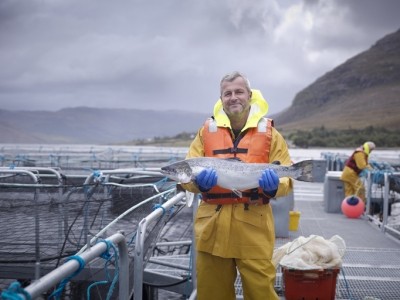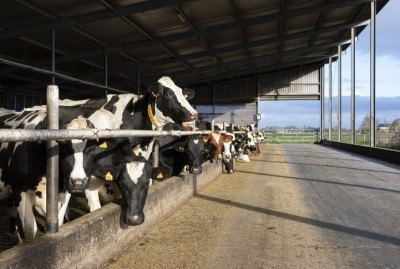DSM: Increased focus on sustainability in agribusiness sector, pressure growing on animal protein companies to step up

“Over the past 18 months, we have seen a lot of change, [the focus on sustainability] has really accelerated. I think that is being driven on a number of fronts. On the one hand, large investors are looking at the large animal protein companies, from a risk and return point of view, and putting pressure on them to step up, in this respect. Consumers are increasingly aware of [environmental impacts of food production] and are looking for food items that are labelled credibly in relation to their sustainability footprint.
“There have been multiple surveys to determine whether consumers are willing to pay more for sustainably produced food that is labelled correctly. There is that willingness there. We see supermarkets testing that out on a limited product range.
“And the industry has to have the measurement of footprint – that is another growth area we see in animal production – life cycle assessments within farming.
“The regulatory environment is also seeing changes, with CPA farm subsidy payments being linked to environmental KPIs, for example,” David Nickell, vice president of sustainability, DSM Animal Nutrition and Health, told FeedNavigator.
A lot of developments underway then, but there are multiple business benefits also arising from this keener focus on sustainability: “Being able to look at your system from a sustainability viewpoint, you can see where there is wastage or leakage within that system. If companies can identify those areas and become much more precise and efficient, it is good for business, it makes perfect sense, and, of course, it is good for the environment. I think people recognize now that the two go hand in hand. Sustainability has become front and center for many businesses worldwide,” he added.
Over six months ago, DSM Animal Nutrition and Health launched a new strategic initiative, called We Make it Possible, with six sustainability platforms underpinning that campaign, to address the major challenges facing the animal farming industry.
The six DSM sustainability platforms are:
- Improving the lifetime performance of farm animals
- Improving the quality of food (i.e., meat, milk, fish, eggs), while reducing food loss and waste
- Reducing emissions from livestock
- Making efficient use of natural resources
- Reducing the reliance on marine resources
- Helping tackle anti-microbial resistance
Nickell debriefed us on how that initiative has developed in the intervening months.
“Those six platforms are very important for our business but also for our innovation pipeline.”
The strategy, he stressed, really fits in with industry priorities.
In bringing nutritional solutions to the farm, the idea, he said, is to extend the lifetime production of farm animals, particularly in relation to the dairy business, keeping the cow on the farm longer for more lactations, or improving the lay cycle of a hen. “We see a lot interest in that.”
Reducing emissions from livestock farming is another area of focus. “Methane production from ruminants is a big topic. Our technology is in the latest stages of registration in Europe; our product, Bovaer, should help the dairy industry decarbonize its value chain. And, within that platform, we are also trying to lower nitrogen and phosphorus emissions, and key to that is our enzyme portfolio.”
Making efficient use of natural resources is a topic that has been top of mind for the industry, how to get to lower protein diets, and make better use of feed ingredients, he said.
“Reducing reliance on marine resources is very much the basis of our Veramaris business, our JV with Evonik, and that is going very well. There is a lot of attention on that issue, how to help the aquaculture industry further grow in a more sustainable way.”
Another platform looks at tackling antimicrobial resistance, capitalizing on the trend to remove antibiotics from many of the production systems, and developing alternatives. “That is an area we have been investing in for many years, with some very exciting innovations in our pipeline coming up in that regard.”
Its strategy to stop food loss and waste includes technology to increase the shelf life of meat by boosting its antioxidant status, or reducing the loss of milk on farm, helping to reduce the incidence of mastitis, the use of antibiotics and the disposal of milk that can’t enter the food chain. “These are some areas that we are working on with tangible results.”
Enzyme technology
Honing in on the platform aiming to make more efficient use of natural resources, he said enzyme technology is key to sustainable animal production: “It is a very dynamic field.”
Enzymes can enable greater use of alternative, local ingredients, an approach that can help reduce European reliance on soy and other major crops - that is fundamental today with a greater emphasis on circularity in feed production a major trend, said Nickell.
“Talking to feed manufacturers, their ability to get access to a wider basket of raw materials is increasingly important.
“It is not just about doing more with less. It is about opening up more raw materials for use in feed formulation by improving their nutritional value.”
Enzyme technology can also result in a 2-5% reduction in the use of added fat sources, he said.
“Through the use of enzymes, we can release more energy from the diet and that means producers don’t have to add as much energy from a fat source to achieve daily weight gain and growth of the animal.”
DSM’s alliance with Novozymes on enzyme development is 20 years long at this stage.
“The partnership explores all areas of enzyme technology - from phytase developments to go to phytate free nutrition which is really important, of course, in terms of phosphorus management, and all the way through to the carbohydrase area and, of course, protease and how we can get better use of protein. The alliance plays across the whole spectrum of enzymes.”
Gleaning insights from working very closely with customers under different circumstances and in different parts of the world, he said the partners are able to leverage that knowledge and improve on what is already out in the marketplace but also to develop next generation products and move into new areas of enzyme technology.
Typically, the focus areas for the industry, when it comes to enzyme use, has been on applications in the poultry and swine production sectors. “But enzymes do extend into other species. In the ruminant business, we have developments, particularly around amylase, and this is particularly relevant for intensive dairy, where the rations are corn based. We focus on improving the digestibility of corn starch, the main energy source for high producing cows. In this way, we look to improve milk productivity, getting more milk of out less.
“And likewise, in the aquaculture business, enzymes such as phytase, are being used for nitrogen and phosphorous management, which are critical parameters in terms of sustainability. Nitrogen and phosphorous flows into the environment, particularly into freshwater, can impact biodiversity and cause the eutrophication of water.”
Protease is key in terms of nitrogen utilization efficiency of protein, to ensure that producers can, firstly, reduce the amount of protein going into the animal’s diet, secondly, that they can improve the digestibility of that protein by the animal itself to ensure greater retention of nitrogen, and, thirdly, that they can ensure that less nitrogen leaves the animal and goes into the environment, added Nickell.
There is going to be a lot more development around this space, he added.
Awareness raising
Is there still a certain amount of awareness raising required in relation to the benefits of feed enzymes? “It depends on where you are in the value chain. Obviously, feed companies know enzymes very well, and use them extensively, particularly the phytases and the carbohydrases.
"I believe there needs to be greater awareness at the farming level, there needs, perhaps, to be greater understanding that these technologies are available, via the feed, and that they can lower the footprint of animal production.”
Often further down the value chain, stakeholders can lack knowledge about such technologies and what they can deliver in terms of sustainability and economic value, he said.
DSM is working with partners in the value chain to raise awareness, engaging with Danone, for instance, on an initiative aimed at improving the environmental profile of dairy farming. “You can’t do it on your own.”















